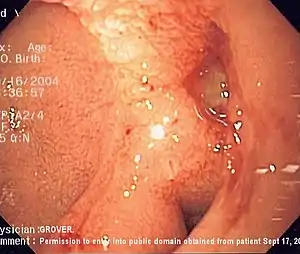Forrest classification
Forrest classification is a classification of upper gastrointestinal hemorrhage used for purposes of comparison and in selecting patients for endoscopic treatment.[1]
Forrest classification

Endoscopy image of a duodenal ulcer in the posterior part of the duodenal bulb without stigmata of recent hemorrhage. This would be a Forrest III lesion
Acute hemorrhage
- Forrest I a (Spurting hemorrhage)
- Forrest I b (Oozing hemorrhage)
Signs of recent hemorrhage
- Forrest II a (Non bleeding Visible vessel)
- Forrest II b (Adherent clot)
- Forrest II c (Flat pigmented haematin (coffee ground base) on ulcer base)
Lesions without active bleeding
- Forrest III (Lesions without signs of recent hemorrhage or fibrin-covered clean ulcer base)[2]
Application
Forrest's classification is instrumental when stratifying patients with upper gastrointestinal hemorrhage into high and low risk categories for mortality. It is also a significant method of prediction of the risk of rebleeding and very often is used for evaluation of the endoscopic intervention modalities.[3] A prospective controlled study revealed that "Forrest criteria are essential for proper planning of endoscopic therapy and urgent surgery in bleeding peptic ulcers".[4]
See also
References
- Block, Berthold; Schachschal, Guido; Schmidt, Hartmut H. (2004-01-01). Endoscopy of the Upper GI Tract: A Training Manual. Thieme. ISBN 9783131367310.
- T. Deist, A. Freytag. "Stomach: Forrest classification in Atlas of Gastroenterological Endoscopy by A. Freytag, T. Deist". www.endoskopischer-atlas.de. Retrieved 2016-04-11.
- Hadzibulic, Edvin; Svjetlana Govedarica. "SIGNIFICANCE OF FORREST CLASSIFICATION, ROCKALL'S AND BLATCHFORD'S RISK SCORING SYSTEM IN PREDICTION OF REBLEEDING IN PEPTIC ULCER DISEASE" (PDF). Archived from the original (PDF) on June 3, 2013. Retrieved 2008-08-11.
- Heldwein W; Schreiner J; Pedrazzoli J; Lehnert P (Nov 21, 1989). "Is the Forrest classification a useful tool for planning endoscopic therapy of bleeding peptic ulcers?". Endoscopy. 21 (6): 258–62. doi:10.1055/s-2007-1010729. PMID 2693077.
- Forrest, JA.; Finlayson, ND.; Shearman, DJ. (Aug 1974). "Endoscopy in gastrointestinal bleeding". Lancet. 2 (7877): 394–7. doi:10.1016/s0140-6736(74)91770-x. PMID 4136718.
External links
This article is issued from Wikipedia. The text is licensed under Creative Commons - Attribution - Sharealike. Additional terms may apply for the media files.